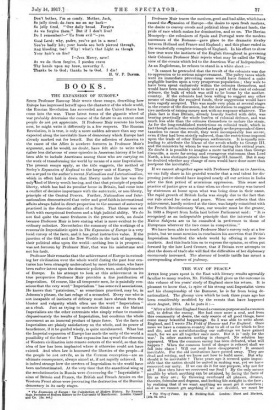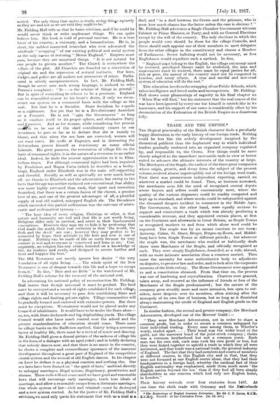THE WAY OF PEACE..
Arran long years spent in the East with literary results agreeably familiar to many readers, Mr. Fielding-Hall gives us the outcome in this volume of ten years' study of England since his return. It is pleasant to know that, in spite of his strong anti-Imperialist views and his championship of the Burmese, he is far from being do- nationalized. The gloomy view which he took three years ago has been considerably modified by the events that have happened since August, 1914. As he puts it
"After a little time England found a common purpose and a common will, to defeat the enemy. She had once more a soul, and from this community of desire, the only source of all good things, have come many beautiful happenings. So I was able to write about England, and I wrote The Field of Honour and For England. Once more wo have a common country dear to all of us for which to live and die, and so notwithstanding our sufferings we have gained much, for wo are all together once more. But it only for the war.' In other matters nothing is changed. No solution has appeared. When the common enemy has been defeated, what will happon 7 When the common bond of danger is relaxed shall we fall into chaos f Will our soul have disappeared ? It seemed inevitable. For the old institutions have passed away. They are dead and rotting, and we know not how to build anew. But why should it be inevitable ? Three years ago it seemed quite impos- sible that the nation should be united in making war, yet we ]rave recovered our unity. If we can do it for one purpose, why not for all ? How then have we recovered our Soul 1 By the only means possible by which anything can be attained, by facing the foots of life as they are ; by throwing overboard all phrases, dreams, theories, formulas and dogmas, and looking life straight in the face ; by realizing that if we want anything we must get it ourselves ; and as we cannot get anything if we are divided, we must be united. Tho only thing that unites is truth, seeing things squarely as they are and not as we are told they ought to be."
Mr. Fielding-Hall tells us that he hates criticism, and if he could he would never think or write unpleasant things. Wo can quite believe him. His book is void of personal rancour. Ho is a true lover of his country, a visionary, and a humanitarian. He is, in short, the mildest-mannered iconoclast who over advocated tho wholesale " scrapping " of our existing political and nodal system as the only means of restoring " Merrie England." Empires most pass, because they ore unnatural things. "It is not natural for one people to govern another." The Church is everywhere the *Main of the plot.. All Churches are founded on a conviction of original sin and the repression of natural instincts. Our laws, Judges, and police are all makers not preventers of crime. Parlia- ment is utterly unrepresentative. In fact, Mr. Fielding-Hall, though he never uses such strong language, is inclined to echo Porson's complaint "D—n the scheme of things in general." But in spite of everything he refuses to be a pessimist. England can be remoulded nearer to his heart's desire, if only we recon- struct our system on a communal basis with the village as the unit. Not that ho is a Socialist. State Socialism he regards as a nightmare. Nor yet that ho is a Revolutionary Anarchist or a Feminist. He is not " agin the Government " so long as it confines itself to its proper sphere, and eliminates Party
and*wsses. And as for woman, while considering her present oelCn to be one of the chief contributory causes to our decadence, ho goes so far as to declare that she is mainly to blame, and that when the sex laws are corrected, women will not want votes. He scoffs at Eugenics, and in distrusting the Referendum proves himself as reactionary as many official Liberals. His great panacea, the restoration of village life on the basis of comnautal rights, is in the nature of a reversion to an earlier ideal. Indeed, lie finds the nearest approximation to it in Eliza- bethan times. For although communal rights had been impaired by Feudalism and Magna Carta (which he describes as a booby- trap), England under Elizabeth was in the main self-supporting and cheerful. Socially as well as spiritually we were much better off—no thanks to Elizabeth and the adventurers, but owing to the facts that the age was neither enslaved nor conventional, that ability was more highly esteemed than rank, that sport and recreation flourished, that there was a certain fusion of the classes, a genuine love of art, and one of the greatest advantages of all, a plentiful supply of real old malted, unhopped English ale. The Decadence which succeeded this partial millennium was the outcome of aristo- cratic and ecclesiastical tyranny The base idea of every religion, Christian or other, is that nature and humanity are oval and that life is not worth living. Religions differ only in method, and never in their fundamental conceptions. However they may try to hide it by professing that I lod made the world, their real certainty is that 'the world, the flesh and the devil ' are one ; however they may profess to be animated by hope, their attitude to life hero and now is one of despair. Nothing can be made of life on earth because its very essence is evil and everyone is ' conceived and born in sin.' Con- sequently, no religion has any ethics founded on a knowledge of life, its realities and needs, and designed to secure further and freer and happier lifo here."
Tho Old Testament not merely ignores but denies " the very foundation of all right living... . Tho whole spirit of the New Testament is one of despair towards this life and a hope to escape from it." In fine, Beer and no Bible" is the watchword of Mr, Fielding-Hall'a scheme for the recovery of the national soul.
In advocating his national policy of reconstruction Mr. Fielding. Hall insists that though universal it must be gradual. The land must be surveyed and a record of rights established for each village, and then it will be necessary to pass Arts establishing State and village rights and limiting private rights. Village communities will be gradually formed and endowed with extensive powers. But there insist be exceptions. Westminster would not be placed under any Council of inhabitants. It would have to be under the State alone— act, too, with State dockyards and big shipbuilding yards. Who village Council would also have much control over the school and the present standardization of education should cease. There must be village banks on the Raiffeisen method. Gaiety being a necessary factor of healthy life, there must be a revival of music and dancing. Mr. Fielding-Hall gives a cliental picture of the sadness of village life in the form of a dialogue with an aged yokel ; and in boldly declaring that nobody dances now, and that there is no music in the country, he shows a complete and extraordinary ignorance of the immense development throughout a great part of England of the competitive choral system and the revival of old English dances. In his chapter on Love he defines it as a physical emotion and nothing else. Our sex lawn have been framed on " the spirit of hate," and lead direetly to unhappy marriages, illegal unions, illegitimacy, prostitution and disease. These exile will not cease until we have good and reasonable laws that will encourage early marriages, teach into ideals of marriage, and allow a reasonable escape from unfortunate marriages. Our whole system of law—civil and criminal—must be destroyed and a new system erected. As for the justice of Mr. Fielding-Hall's criticism, we need only quote his statement that with us a trial is at
duel, and "in a duel between the Crown and the prisoner, who is poor, how much chance has the latter unless the ease is obvious ? " Mr. Fielding-Hall advocates a Single Chamber Government without Cabinet or Prime Minister, or Party, and with no General Elections except by the will of the country. The only elections in which the people would vote should be those for the village Councils, end these should each appoint one of their members to meet delegates from the other villages in the constituency and choose a Member of Parliament. Secret balloting would not be necessary, as free Englishmen would repudiate such a method. In fine, " England must belong to the English, the village autonomy must be restored, privileged classes must be abolished, the inns and amusements must be revived, there must be equal justice for all, rich or poor, the money of the country must not be congested in London, and many others. A true and careful and universal system of education will do the rest."
Thin education involves the scrapping of our Public Schools, which taboo intelligence and breed snobs and incompetents. Mr. Fielding- Hall shows some glimmerings of sagacity in his final chapter on " When War will End," but his statement that the real causes of the war have been ignored by everyone but himself is ostrich-like in its innocence, and his support of our cause is considerably offset by hie denunciation of the Federation of the British Empire as a disastrous folly.



























 Previous page
Previous page